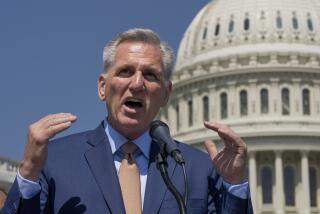Brazil’s Hold on Debt Service Seen Continuing
- Share via
RIO DE JANEIRO — Brazil’s undeclared moratorium on private foreign debt payments is likely to continue until after a new Brazilian president takes office in March, foreign bank executives say.
Although Brazil has been servicing its debts to international lending institutions and foreign governments, it has not made any payments since July on long- and medium-term loans from private foreign banks.
“I don’t think there is much of a chance of the banks seeing anything until the new government comes in,” an American banker in Sao Paulo said.
A Brazilian executive in a foreign bank’s Rio office agreed, predicting “inactivity with respect to the foreign debt” for the rest of the current Brazilian administration.
Brazil’s foreign debt of about $112 billion is the largest among the developing countries. It was estimated at $120 billion in 1987, but payments to international institutions and conversion of debt into investment equity have whittled the total.
Nearly $70 billion represents long- and medium-term loans from 300 private foreign banks. At the beginning of July, Brazil quietly stopped paying the banks interest on those loans except for “voluntary” refinancing credits of about $1 billion.
An additional $15 billion in short-term trade credits from foreign banks has not been affected by the freeze because Brazil needs continued financing for its imports and exports.
In mid-September, when $1.6 billion in interest payments came due, the total of unpaid arrears rose to more than $2 billion and will reach $3.2 billion by year-end, a foreign banker estimated. The newspaper Jornal do Brasil said the arrears will rise to an estimated $5.2 billion March 15, when a large new concentration of interest payments comes due.
“When the new president takes charge of the government on March 15, he will be right in the eye of a hurricane with regard to the foreign debt,” said an article in Sunday’s Jornal do Brazil.
All leading candidates in the Nov. 15 presidential election have called for negotiations to reduce payments on the foreign debt. Fernando Collor de Mello, the front-running candidate in opinion polls, has said he will suspend official guarantees for repayment of loans that were not contracted by the central government.
“Without reducing remittances of foreign currency, there is no possibility for self-sustained growth,” Collor told a Sao Paulo newspaper. “The priority will be growth; payment comes afterward.”
Brazilian economic growth is currently stagnant, and monthly inflation reached 37.6% in October. Investment capital is being drawn off by a short-term money market in which the government borrows heavily at high interest rates to finance its operating deficit.
Finance Minister Mailson Nobrega has tried to reduce the deficit by cutting government expenditures, but election-year politics and an administration in its last months have not fostered austerity. Unofficial reports that Nobrega may resign soon have appeared in the Brazilian press for several days.
The government has failed to hold its deficit to within 2% of gross domestic product, a goal set by an agreement with the International Monetary Fund. As a result, the IMF and other lenders are holding back about $2 billion in previously scheduled credits to Brazil, including $600 million in new money from private foreign banks.
Bankers say a revised agreement with the IMF could release the $600 million and end the freeze on Brazil’s payments to the banks. But chances of an agreement this year are “very slim,” one banker said.
“We’re too close to elections now,” he said. “The IMF is still keeping things in abeyance until they have a more defined situation.”
Brazilian officials are reluctant to talk about the freeze on interest payments, but they emphasize that the government’s main concern is maintaining a safe level of foreign currency reserves.
Without new credits, bringing all payments up to date would lower foreign reserves to near $4 billion, a level considered critical by Brazilian officials. They say that with less than $4 billion in reserves, financial insecurity could trigger hyperinflation and financial chaos.
Strong trade surpluses have bolstered Brazil’s foreign reserves, but the surplus for September dipped to $1.1 billion from $2.2 billion in June.
In February, 1987, President Jose Sarney announced a moratorium on interest payments to private foreign banks after reserves fell below $4 billion. The moratorium was lifted in early 1988 after Brazil, and a committee of bankers agreed on a rescheduling package that lowered interest rates and provided $5.2 billion in new loans to help pay overdue interest.
The $600 million that the banks are now withholding was to be the last disbursement of the new money.
More to Read
Sign up for Essential California
The most important California stories and recommendations in your inbox every morning.
You may occasionally receive promotional content from the Los Angeles Times.












